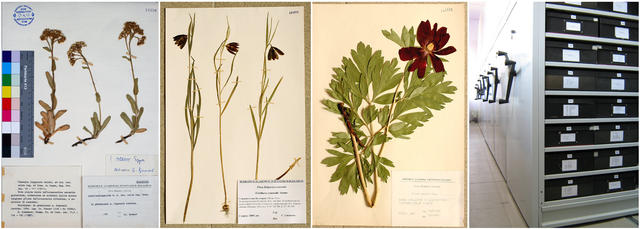Herbarium SOM
Herbarium of the Institute of Biodiversity and Ecosystem Research, Bulgarian Academy of Sciences (SOM)
Overall information
What is a herbarium specimen?
Herbarium specimens are dried and pressed plants stuck on a sheet of cartridge with a label attached in the bottom right-hand corner to indicate provenance, collector and identity. Each specimen in the herbarium has a unique reference number.
Type specimens
The Herbarium contains over 450 type specimens - the original specimens on which new species descriptions have been based.
Importance
The herbarium collections are invaluable national treasure with primary significance in the following fields:
1. Scientific studies
- The collections are the basis of all taxonomic and floristic studies on the flora and vegetation of Bulgaria and other, mostly European countries. Therefore, the development of the taxonomy and plant systematics is impossible without these collections. Especially important are the type specimens (ca. 350 of vascular plants).
- The collections are the basis for elaboration of the multivolume editions of “Flora of Republic of Bulgaria” (11 vols published so far) related to the inventory of the national plant gene fund.
- The collections are the most reliable, specimen-based source of information about the distribution of taxa in space and time, their ecology, biology, population size and structure. The great advantage of the collections, compared to literature data, is that the taxonomic affiliation of a specimen can always be checked and reliably identified.
- In accordance with internationally accepted rules the collections include the voucher specimens of all cytotaxonomic, phytochemical, chemotaxonomic and other studies carried out in the Department of Plant and Fungal Diversity and Resources and partner scientific institutions. These collections, kept separately, provide the opportunity for taxonomic revisions of the specimens and verification of the data and scientific results.
- The collections are widely used as a reliable source of comparative material for species identification in all studies on plants in the country.
- The collections are basis of international partnerships and participation of IBER in international projects and initiatives such as Euro+Med PlantBase and BioCASE (both EU-funded projects), Global Biodiversity Information Facility, Important Plant Areas etc. Very important is their role in the international exchange of material and especially in the service they provide to scientists from all over the world in the taxonomic and systematic studies, revision of material, preparation of monographs etc.
- Applied research and activities
- The collections are the primary source of specimen-based information for all projects of national significance commissioned by the respective governmental authorities and related to the plant and habitat diversity in the country, e.g. the establishment of the national NATURA 2000 network, National Biodiversity Monitoring Programme, Assessment of the alien and invasive species in the Bulgarian flora, etc.
- Especially important are the collections in the biodiversity conservation in the country since they provide the most reliable data, e.g. for the elaboration of the Red Lists and Red Data Book of plants and habitats, national legislation related to biodiversity conservation, Action plans for conservation of critically endangered species and management of protected areas.
- The collections provide important data (taxonomic affiliation, distribution, population size, phenology and ecology) about wild plants of economic importance which data are used in the elaboration of Plans for sustainable use of the wild resources and determination of the annual quota for the different species.
- The collections are of primary importance in the service IBER provides to NGOs and private companies working with medicinal plants, fruits of wild plants as well as to governmental authorities with the expertise in the identification of drugs and illegal trade with plant species.
- Education and training
The collections are widely used in the education and training of students from partner Universities and are primary source of information for elaboration of all (including foreign) MSc, PhD and DSc theses and monographic works, involving species from the Bulgarian flora.
Access to herbarium specimens
Visits to the Herbarium
The Herbarium is open to researchers by appointment only. If you would like to arrange a visit to the Herbarium, please ensure you apply by email at least two weeks in advance of your expected arrival and your email must contain the following information:
Email Subject: Please start with the word VISIT and the date of arrival and departure (eg VISIT 20 – 23 July 2017). Please note we are closed at the weekend and public holidays.
Taxonomic groups: Please indicate all the plant families or genera you wish to look at.
Exact dates of stay: Please repeat this information, ensuring that there are at least two clear weeks from the email date to the date when you wish to visit SOM.
Your details: Please ensure you include your full name and full address of your institution or your personal address if you are a private researcher.
Confirmation: If you are a student, please ask your supervisor to request the visit on your behalf to confirm that the research is required for your studies.
You can find more about the Access to herbarium specimens by clicking here.
Please then email this information to herbarium.som@gmail.com
Loan requests*
Please email requests for loans to:
*It is necessary to note that due to financial difficulties sending specimens in loan by post is currently very limited.
Contact the Herbarium
Herbarium of the Institute of Biodiversity and Ecosystem Research,
Bulgarian Academy of Sciences,
Department of Plant and Fungal Diversity and Resources
Acad. G. Bonchev Str., bl. 23
1113 Sofia
Bulgaria
Curator: Assoc. Prof. Vladimir Vladimirov, PhD
Assistant curator: Assistant Aneta Lambevska-Hristova, MSc.
Email: herbarium.som@gmail.com

